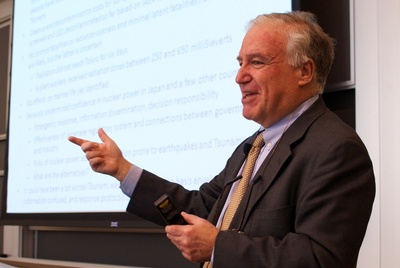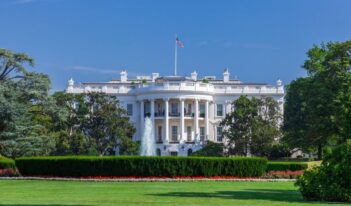
PPR seminar considers how Japan disaster will affect nuclear power globally.
Despite widespread concern about the fate of nuclear power after the disaster at the Fukushima nuclear plant in Japan, Paul Joskow, the President of the Alfred P. Sloan Foundation and the Elizabeth and James Killian Professor of Economics, Emeritus, at MIT predicts that the current global expansion of nuclear power will not slow down substantially.
At a recent risk regulation seminar organized by the Penn Program on Regulation, Joskow indicated that only moderate changes in the use and expansion of nuclear power would occur in the wake of the Fukushima incident.
A number of countries, including Germany and Switzerland, have responded to the accident at Fukushima by implementing plans to shut down older nuclear plants or halt the construction of new plants. However, according to Joskow, the global shift in public acceptance of nuclear power will not likely be as large as predicted.
Joskow argued that even before the Fukushima accident, only modest additions in nuclear generating capacity were expected in most developed (OECD) countries. “This is the case because of high construction costs of new nuclear plants,” he observed, “especially compared to natural gas fueled plants in the U.S., various subsidies and preferences to promote wind and solar technologies in many countries, and slower growth in electricity demand.”
Prior to the Japanese disaster, most of the growth in nuclear capacity was forecast to be in developing countries, especially China, Russia, and India. “The Fukushima accident does not seem to have affected the interest of these countries in building many more nuclear plants,” Joskow said.
Even in the U.S., the Nuclear Regulatory Commission earlier this year has authorized the construction of new nuclear power plants in Georgia and South Carolina, the first time new nuclear plants were approved since 1978.
Although heightened safety concerns will increase the costs of maintaining and building nuclear power plants, Joskow suggested that nuclear power regulation would benefit from globally consistent operating safety standards combined with rigorous peer review inspections and reporting in order to prevent another serious nuclear accident in the future.
Joskow’s remarks echoed those in his paper, The Future of Nuclear Power After Fukushima, in which he and co-author John Parsons articulate their judgment that shaken global confidence over nuclear power will not have a strong effect on the industry’s expansion as a whole, but will have secondary effects such as inducing the development of enhanced safety protocols.



